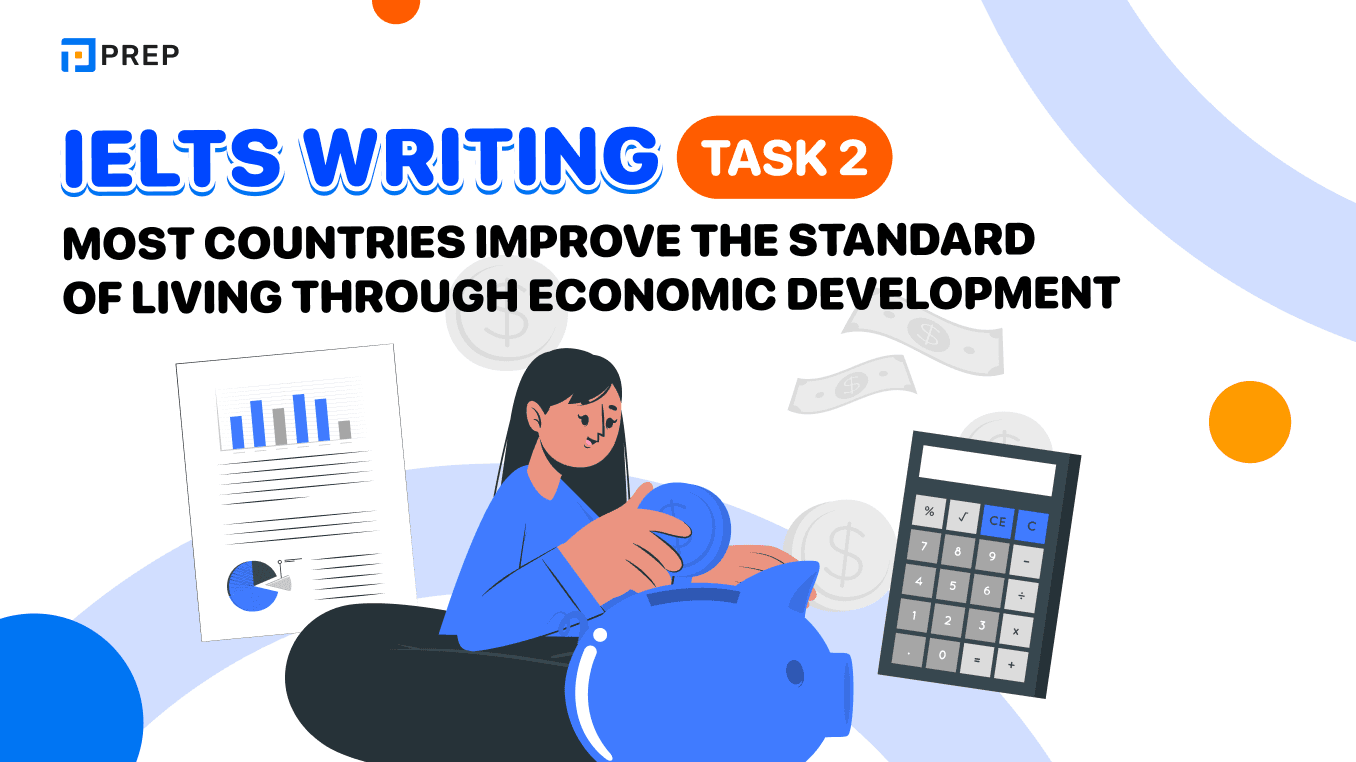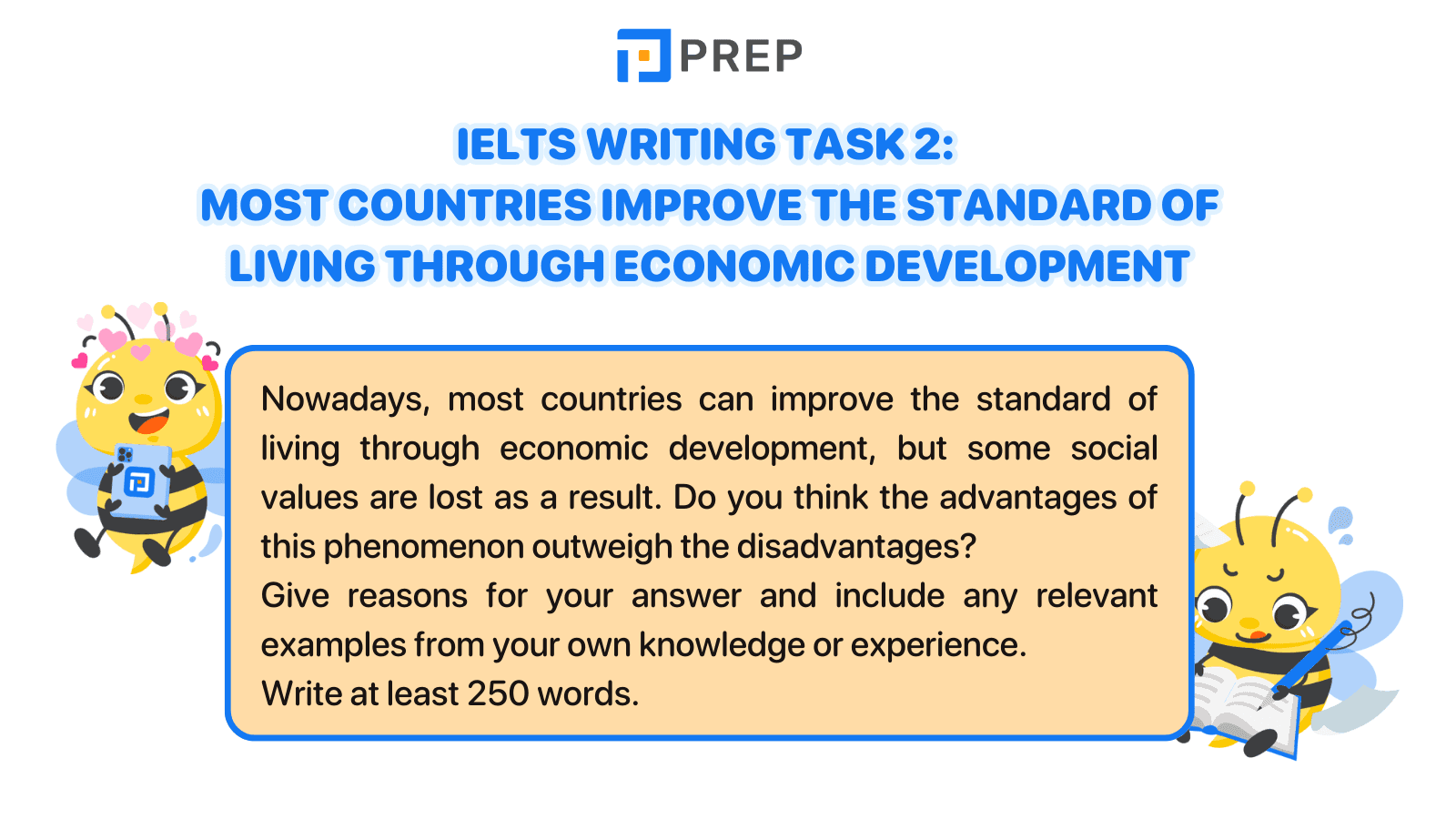Sample IELTS Writing Task 2 Most countries improve the standard of living through economic development
“Most countries improve the standard of living through economic development” is a prompt that appeared in the actual IELTS exam. In today’s article, let’s explore the prompt, outline, and useful vocabulary used in the sample IELTS Writing Task 2 Most countries improve the standard of living through economic development!
*This sample was prepared by Mr. Nhat Pham, an IELTS 8.5 Overall achiever (9.0 Listening, 9.0 Reading, 8.0 Writing, 7.5 Speaking) and Marker Leader at PREP.

I. Prompt and Suggested Outline for IELTS Writing Task 2 Most countries improve the standard of living through economic development
Let’s join PREP to explore the prompt and suggested outline for IELTS Writing Task 2 Most countries improve the standard of living through economic development below!
1. Prompt
You should spend about 40 minutes on this task.
Write about the following topic:
Nowadays, most countries can improve the standard of living through economic development, but some social values are lost as a result. Do you think the advantages of this phenomenon outweigh the disadvantages?
Give reasons for your answer and include any relevant examples from your own knowledge or experience.
Write at least 250 words.

2. Outline for IELTS Writing Task 2
Quickly refer to the outline for IELTS Writing Task 2 Most countries improve the standard of living through economic development below!
|
Introduction |
|
|
Advantages of this phenomenon |
|
|
Disadvantages of this phenomenon |
|
|
Conclusion & Opinion |
|
II. Sample IELTS Writing Task 2 Most countries improve the standard of living through economic development

Below is a high-quality sample essay for IELTS Writing Task 2 Most countries improve the standard of living through economic development, crafted by Nhat Pham, a Marker Leader at PREP. Be sure to check it out!
Economic development has undoubtedly improved the standard of living in many countries, yet it is often claimed to cause the erosion of certain social values. In my opinion, while there are notable advantages to this situation, they are outweighed by the drawbacks.
There are certain reasons to justify the gains of this development. Firstly, a better quality of life powered by economic growth can encourage people to leave behind social values that are considered archaic or discriminatory. Improved economic conditions, for instance, have proven to universalize educational opportunities, enabling women and girls to learn alongside men, which was hardly possible in pre-industrial societies due to the scarcity of resources. Furthermore, a loss of certain social values might be compensated by higher economic stability and social mobility, all of which are fundamental indicators of happiness. By having financial security and clear opportunities for advancement thanks to economic progress, people could lift themselves out of poverty, and become fulfilled without holding on to intangible values.
The drawbacks of such a situation are substantial and often weightier than the advantages, however. As societies become wealthier, there is often a shift towards individualism and materialism, which can weaken family bonds and community cohesion. The pursuit of career success and financial gain, for example, can lead to people spending less time with their families, thereby diminishing the importance of familial relationships. Economic development, furthermore, powers rapid urbanization, which can erode traditional cultural icons and values alike. As cities expand, increasingly more people migrate to them in search of better opportunities, which might lead to historical sites being replaced with modern infrastructure. A loss of cultural identity, thus, is likely to happen, as local people may feel as though they were in a foreign land.
In conclusion, while economic growth is capable of propelling living standards, I believe that the disadvantages from the erosion of some social values clearly overshadow the benefits. To avoid undermining the stability of communities, governments and communities should strive to preserve the cultural heritage and unity besides development.
Useful vocabulary in the sample essay for IELTS Writing Task 2 Most countries improve the standard of living through economic development:
-
Erosion (n.): The process by which soil and rock are removed from the Earth's surface by natural processes such as wind or water.
-
Power/propel sth (v.): To provide the force or energy that drives or moves something forward.
-
Archaic (adj.): Relating to an earlier period; outdated or no longer in common use.
-
Discriminatory (adj.): Characterized by unfair treatment of different categories of people, especially on the grounds of race, age, or sex.
-
Universalize sth (v.): To make something applicable or accessible to all people or situations.
-
Pre-industrial (adj.): Referring to the period before the industrial revolution; characterized by manual labor and agrarian economies.
-
Scarcity (n.): The state of being in short supply; a situation where resources are limited compared to demand.
-
Compensate sth (v.): To make up for something, often by providing an equivalent or balancing benefit.
-
Fundamental (adj.): Forming a necessary base or core; essential or foundational.
-
Indicator (n.): A sign or piece of information that indicates the state or level of something.
-
Intangible (adj.): Unable to be touched or physically measured; not having a physical presence.
-
Substantial (adj.): Of considerable importance, size, or worth; significant.
-
Shift (n.): A change in position, direction, or focus.
-
Individualism (n.): A social theory that emphasizes the moral worth of the individual and the importance of personal independence and self-reliance.
-
Materialism (n.): A tendency to consider material possessions and physical comfort as more important than spiritual or intellectual values.
-
Diminish sth (v.): To make something smaller or less important.
-
Migrate (v.): To move from one place to another, often for the purpose of settling in a new location.
-
Overshadow sth (v.): To appear more prominent or important than something else, often causing it to seem less significant.
-
Undermine sth (v.): To weaken or damage something gradually or secretly.
In this article, PREP has shared a high-quality sample for IELTS Writing Task 2 on the topic of how most countries improve the standard of living through economic development. Be sure to follow PREP for more IELTS Writing Task 2 articles!
PREP is the only platform offering a comprehensive Writing evaluation process powered by AI technology. The system automatically detects and corrects errors in vocabulary and grammar while identifying critical mistakes that could lower your exam score. Using an exclusive scoring system with 4 main criteria and 11 sub-criteria, it helps you pinpoint common errors, analyze them, and provides detailed solutions in an easy-to-follow interface.
In addition to identifying mistakes, the system highlights your strengths in vocabulary, grammar structures, and ideas, helping you enhance these in future exams. It also offers tailored suggestions to address weaker areas, allowing you to improve step by step and effectively boost your band score.
Download the PREP app now to study IELTS at home and experience a high-quality online preparation program designed to help you achieve your target scores.

Hi I'm Chloe, and I am currently serving as an Product Content Administrator at Prep Education. With over five years of experience in independent online IELTS study and exam preparation, I am confident in my ability to support learners in achieving their highest possible scores.
Comment
Premium content
View allPersonalized roadmap
Most read












